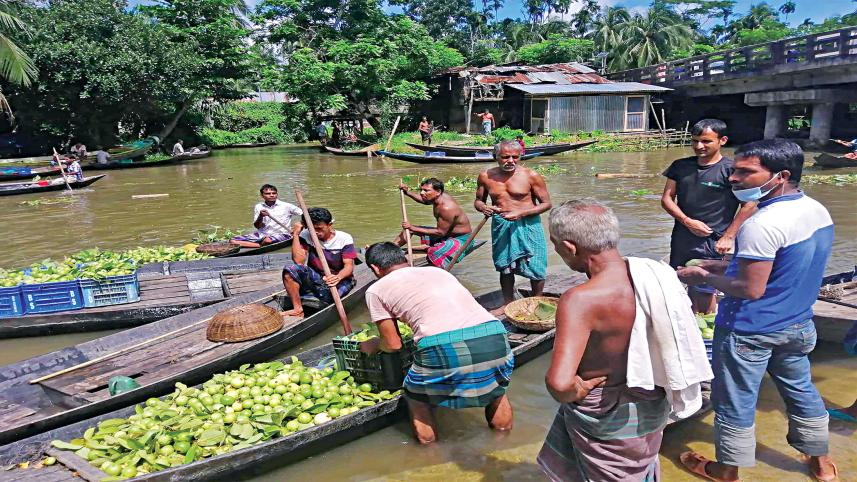Barishal’s guava traders in a pickle

Guava traders in Barishal district are on the verge of heavy losses this year due to the low turnout of buyers and drastic fall in demand for the fruit in Dhaka and Chattogram caused by the ongoing Covid-19 pandemic.
The fruit is cultivated in 43 villages of Pirojpur, Jhalakati and Barishal on around 2,077 hectares of land. Over 20,000 tonnes of guava, valued at Tk 30 crore, are produced each year and is sold at about Tk 15,000 per tonne.
Around 800 tonnes of guava are sold daily during the peak season from July to mid-August, however, this year's scenario is totally opposite, according to officials from the local Department of Agricultural Extension (DAE).
There was no problem with production this year, the officials said, adding that the coronavirus just broke the whole supply chain and cut demand by a half.
"So, this year they [the traders] may count a loss of Tk 15 crore," they said. "I used to send 300 maunds of guava each day to Dhaka and the port city. But this year, I could manage orders for only 100 maunds a day," said Tarun Howladar, a guava wholesaler based in Shatadashkathi in Nesharabad upazila of Pirojpur district. One maund is approximately 37 kg.
"Many gardens have remained unsold due to a lack of buyers," said Tapan Howlader of Adabari village in Nesarabad.
Guava farmers in the Barishal belt are getting more frustrated by the day as very few wholesalers are coming to the orchards to buy local variety of the fruit.
Moreover, the Covid-19 crisis has eaten up the savings of many wholesalers, who are subsequently unable to make purchases and send the produce to the capital or port city.
Every year, around 800 tonnes of guava are bought and sold each day through at least 10 wholesale centres in the region. This statistic has since fallen below 500 tonnes per day this year, according to DAE data.
"We think prices will see a 50 per cent cut because of the reduced demand for the fruit," said Suvojit Halder, a wholesaler at the Bhimruli floating guava market under Jhalakati district.
"This time, both the number of traders and wholesalers have decreased significantly due to the coronavirus outbreak," said Nittananda Samadder, president of Peara-Amra Bagan Malik Samity in Kuriana, an association of guava and hog plum orchard owners.
"We believe sales will be 50 per cent less than what they were in the previous year," Samadder added.
Getting real value for the produce would be a tough task this year, local guava farmers said.
"If we don't get the actual price, we will have to count heavy losses this year as we depend on guava production year-round," said Tapos Samadder, a guava trader of Adabari village in Nesarabad.
Large-scale wholesaler from Dhaka, Narayanganj and Chattogram are not placing orders with the same volume as previous years, said Md Fayzuddin, a wholesale trader of Huriana union under Nesarabad.
The thousands of people involved in the business could suffer this year as wholesalers are struggling to send guavas to Dhaka and Chattogram, said Tapan Howlader.
"This season, guava production suffered from spot disease," said Chapal Krishna Debnath, upazila agriculture officer of Nesarabad.
"However, the disease could not leave any lasting impact on yield. But the coronavirus did some harm," he added.
The Covid-19 restricted local farmers from reaching the buyers in time, he said.
"They now fear that they may fail to get back the money they spent on the orchards for the last one year."
The farmers will not have to count any losses if there was a cold storage to preserve the guavas, he said.
If the situation continues for long, the farmers of the fruit would be in big trouble this season, said Tapos Samadder.
"Despite losing our savings due to coronavirus, we spent the last money we had on guava farming. For our survival, we now need low-cost loans from the government,"
The guava cultivators also urged the government to set up cold storages in the region so that they can preserve guava during peak harvesting season and ensure its supply throughout the year.



 For all latest news, follow The Daily Star's Google News channel.
For all latest news, follow The Daily Star's Google News channel.
Comments